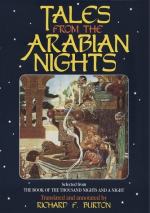Von Hammer began by summoning into Court the “Herodotus of the Arabs, (Ali Abu al-Hasan) Al-Mas’udi who, in A.H. 333 (=944) about one generation before the founding of Cairo, published at Bassorah the first edition of his far-famed Muruj al-Dahab wa Ma’adin al-Jauhar, Meads of Gold and Mines of Gems. The Styrian Orientalist[FN#129] quotes with sundry misprints[FN#130] an ampler version of a passage in Chapter lxviii., which is abbreviated in the French translation of M. C. Barbier de Meynard.[FN#131]
“And, indeed, many men well acquainted with their (Arab) histories[FN#132] opine that the stories above mentioned and other trifles were strung together by men who commended themselves to the Kings by relating them, and who found favour with their contemporaries by committing them to memory and by reciting them. Of such fashion[FN#133] is the fashion of the books which have come down to us translated from the Persian (Farasiyah), the Indian (Hindiyah),[FN#134] and the Graeco-Roman (Rumiyah)[FN#135]: we have noted the judgment which should be passed upon compositions of this nature. Such is the book entituled Hazar Afsanah or The Thousand Tales, which word in Arabic signifies Khurafah (Facetioe): it is known to the public under the name of ’[he Boot of a Thousand Nights and a Night, (Kitab Alf Laylah wa Laylah).[FN#136] This is an history of a King and his Wazir, the minister’s daughter and a slave-girl (jariyah) who are named Shirzad (lion-born) and Dinar-zad (ducat-born).[FN#137] Such also is the Tale of Farzah,[FN#138] (alii Firza), and Simas, containing details concerning the Kings and Wazirs of Hind: the Book of Al-Sindibad[FN#139] and others of a similar stamp.”
Von Hammer adds, quoting chaps. cxvi. of Al-Mas’udi that Al-Mansur (second Abbaside A.H. 136-158 = 754-775, and grandfather of Al-Rashid) caused many translations of Greek and Latin, Syriac and Persian (Pehlevi) works to be made into Arabic, specifying the “Kalilah wa Damnah,"[FN#140] the Fables of Bidpai (Pilpay), the Logic of Aristotle, the Geography of Ptolemy and the Elements of Euclid. Hence he concludes “L’original des Mille et une Nuits * * * selon toute vraisemblance, a ete traduit au temps du Khalife Mansur, c’est-a-dire trente ans avant le regne du Khalife Haroun al-Raschid, qui, par la suite, devait lui-meme jouer un si grand role dans ces histoires.” He also notes that, about a century after Al-Mas’udi had mentioned the Hazar Afsanah, it was versified and probably remodelled by one “Rasti,” the Takhallus or nom de plume of a bard at the Court of Mahmud, the Ghaznevite Sultan who, after a reign of thirty-three years, ob. A.D. 1030.[FN#141]




